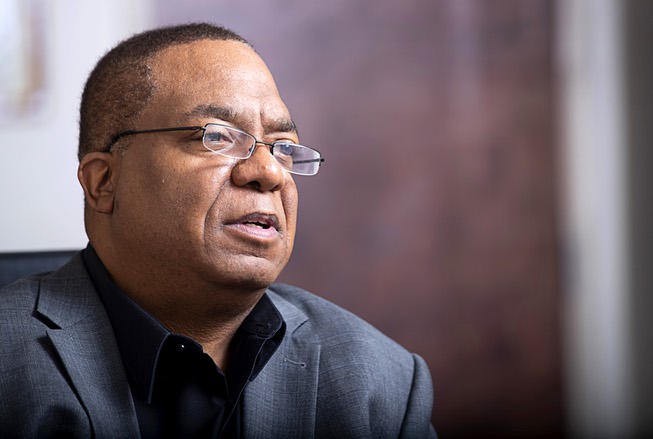
UNLV president Keith Whitfield responds to a question during an interview in his office at UNLV Tuesday, Aug. 16, 2022.
Friday, Nov. 24, 2023 | 2 a.m.
As some college students protest over the war between Israel and Hamas terrorists in Gaza, officials at UNLV are toeing a fine line between protecting free speech and quelling concerns that some demonstrations have allowed antisemitic rhetoric.
UNLV President Keith Whitfield on Monday issued a statement acknowledging the “range of emotions” seen on campus since the Oct. 7 terror attacks by Hamas in Israel and the ensuing war.
Whitfield’s letter to the campus community came days after a group supporting the Palestinian people rallied on the UNLV campus, according to social media accounts.
In a reel posted to Instagram, one demonstrator said, “The Israel state shouldn’t exist.” Another proclaimed, “I believe a lot of the terror things happening in this world is Israel.”
Whitfield said three protests over the war have been staged on campus since the conflict began. A number of educational workshops and vigils have also taken place.
The Hamas attack in several kibbutzim last month killed more than 1,200 Israeli civilians. More than 240 others were taken hostage.
Israeli operations, including air strikes, as of Tuesday had killed at least 13,000 Palestinians — about 5,600 of them children, according to the Mideast news outlet Al Jazeera.
Israel and Hamas late Wednesday agreed to a four-day cease-fire, a breakthrough that is intended to free dozens of hostages held by Hamas and Palestinians imprisoned in Israel. The pause will also allow a large influx of aid to the besieged territory.
“While the war in Gaza is far from us, its impact is felt here too,” Whitfield said, noting UNLV was committed to hearing from individuals and groups “with different perspectives and positions.”
“In some instances, the people participating in — or even organizing — these activities are not members of the campus community. But as a public urban university, every individual has a right to visit our campus,” he said.
At the same time, Whitfield acknowledged the need to reject antisemitism “in all its forms” and vowed to “combat it whenever we see it.”
“I also recognize that Muslims face discrimination and are victims of violence in our country,” he said. “We reject any discrimination against those of the Muslim (faith) and will work to promote a campus free from hate.”
Whitfield said UNLV was dedicated to providing a “safe and inclusive environment” for students and staff.
People should report any discriminatory practices, behavior or incidents, he said. Cases of threats or intimidation “are of paramount concern” and will be investigated, he said.
Jonathan Fine, a member of the UNLV Foundation board of trustees, which governs the university’s philanthropic arm, sent a letter to trustees and other high-ranking officials from UNLV, urging for greater dialogue around the Israel-Palestine conflict and how the university can combat what he called rampant misinformation that could possibly incite violence.
“Some people are giving false information about what’s happening,” Fine said. “And there are outside factors, outside groups that are inciting or trying to incite violence and outrage. And I think the only way to mitigate that is through education.”
That letter was not meant to be a retort to Whitfield’s handling of recent demonstrations, but to also inform colleagues about what was going on around campus, Fine said.
“When the Kerkorian School of Medicine had their grand opening, there were some trustees that didn’t know about it,” Fine said. “So I was just basically saying to everyone, ‘Hey, there are things going on at this campus. You’re not hearing about it but there are things going on around this campus.’ ”
Whitfield said he would continue to work with university leadership to “assess whether any campus activities or protests exceed the boundaries of the First Amendment, and what additional measures might be necessary to further ensure the safety of our campuses.”
“We will continue to proactively monitor the situation in order to take action when warranted and necessary,” he said.
On other campuses across the country, long-simmering tensions are erupting in violence and shattering the sense of safety that makes colleges hubs of free discourse.
Students on both sides are witnessing acts of hate, leaving many fearing for their safety even as they walk to classrooms.
Threats and clashes have sometimes come from within, including at Cornell, where a student is accused of posting online threats against Jewish students.
A University of Massachusetts student was arrested after allegedly punching a Jewish student and spitting on an Israeli flag at a demonstration.
At Stanford, an Arab Muslim student was hit by a car in a case being investigated as a hate crime.
Colleges have been scrambling to restore a sense of security for Jewish and Arab students — and stressing messages of inclusion for diverse student bodies. But untangling what’s protected as political speech and what crosses into threatening language can be a daunting task.
After facing criticism for trying to remain too neutral on the war, Harvard University’s president last week condemned the phrase “from the river to the sea,” saying it has historical meanings that, to many, implies the eradication of Jews from Israel.
The Associated Press contributed to this report.
Fine is a relative of Sun CEO and publisher Brian Greenspun.
